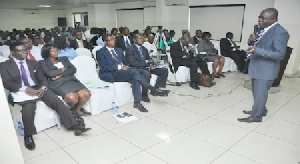PwC Ghana has observed that consistent policy interventions across agriculture, services and industry would be key to government’s transformational agenda.
“In Ghana, for the current Budget to be transformational, it would need to accelerate growth in the agricultural sector by increased mechanisation,” says Felix Addo, Country Senior Partner PwC Ghana.
Speaking at a budget forum, Mr Addo said sustained investments in agriculture, manufacturing and infrastructure are central to economic transformation.
Across the high export commodities for Ghana, agriculture represents the only sector where a sustained increase in local processing is likely to add significant value to the economy, he said in a commentary on the 2015 budget statement.
According to PwC, radical structural policy interventions that increase mechanisation in agriculture are necessary to boost economic growth since they would pave the way to local manufacturing, processing of natural resources and reduce export deficit and budget deficit while also providing local employment.
However, government’s intentions to boost poultry farming, rice production, fisheries and aquaculture as captured in the budget, might not be enough to significantly diversify the economy and government would need to be more radical.
“PwC believe that although the budget statement lays out the framework for a transformational agenda with well-intended and timely policy interventions, the policies could have been a bit more aggressive,” Mr Addo said.
There is also the need for emphasis to be placed on the macro-economic environment; inflation, infrastructure, investment in physical and human capital, currency strength and vulnerability to external shocks.
The 2014 Budget sought to re-align objectives to meet key national priorities in order to enhance the resilience of the economy against risks, and promote accelerated growth and development with job creation.
However, it would prove to be a tough year, as the economy is plagued by severe macroeconomic imbalances such as consistently high inflation rates, current account and fiscal deficits, and massive foreign exchange swings which led to a highly depreciated domestic currency.
Business News of Friday, 5 December 2014
Source: GNA
PwC Ghana holds budget forum
Entertainment












